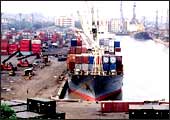|
|
| Doors of trade: Letting
in much more than sending out |
In
the Indian context, "First Time Aberration" is a more
appropriate expansion of the acronym FTA, which otherwise stands
for Free Trade Agreement. FTAs are aimed at promoting trade between
countries on a bilateral, symbiotic basis. But that's where one
of the early Indian FTAs, with Thailand, has begun to sour. Trade
data shows that we have exported less and imported more from the
East Asian major in recent times.
Fortunately, the Thais have so far enjoyed
only a diet menu, and not the entire spread-in trade terms, that
means the 'early harvest programme' (EHP) on which the Indian
government has allowed zero-duty imports, beginning a few years
ago.
Between 2004 and 2005, imports from Thailand
jumped 47 per cent. What is more critical is that the EHP imports
jumped 80 per cent. On the other hand, India's overall exports
to Thailand grew 12.5 per cent, while exports pertaining to EHP
have dropped 2.3 per cent.
The consequent injury to domestic manufacturers
was only to be expected. Reason: the government did not undertake
detailed discussions with industry when it opened the gates. "The
situation now is far better than before. However, there is scope
for vast improvement. There is need for greater interaction between
industry and government," says T.K. Bhaumik, Chief Economist,
Reliance Industries. Adds LG Electronics India Vice President
Girish Rao: "We are hopeful that the government will do the
needful in ensuring a level playing field with regard to taxes
vis-a-vis the ASEAN countries."
Argues Bhaumik, who was previously Senior
Advisor, Confederation of Indian Industry: "Industry organisations
need to hire better talent to understand the sectoral needs and
comprehensively communicate it to the government."
Evidently, the government is attempting to
get its act together. "We are tapping high knowledge teams
across the country. The need of the hour, however, is to institutionalise
it. And, we are working on doing so," says Commerce Secretary
S.N. Menon.
Importantly, the impact of hastily opening
trade doors is not lost on the polity. Close to 60 per cent of
the Indian workforce still depends on the agriculture sector,
which contributed 17.6 per cent of the country's gross domestic
product in 2004-05, down from 25.9 per cent in 1995-96. The political
class understands that farmer suicides and industrial joblessness
as a result of unfavourable trade deals are a one-way ticket to
political oblivion. UPA Chairperson Sonia Gandhi has written to
the government highlighting the pitfalls of such treaties. And
Finance Minister P. Chidambaram is worried about revenue losses.
But then, a defensive play is not enough.
Export competitiveness is no longer a choice but an imperative.
Just as companies need to improve their operations, the government
needs to improve the infrastructure it provides industries. Power
tariffs and transaction costs need to come down. Clogging at ports
must ease and rail movement must become faster.
With the margin for error narrowing, the
government's trade gatekeepers, on their part, need to be careful
as they negotiate the country's trade deals with neighbours.
|




